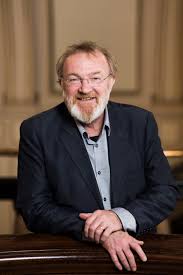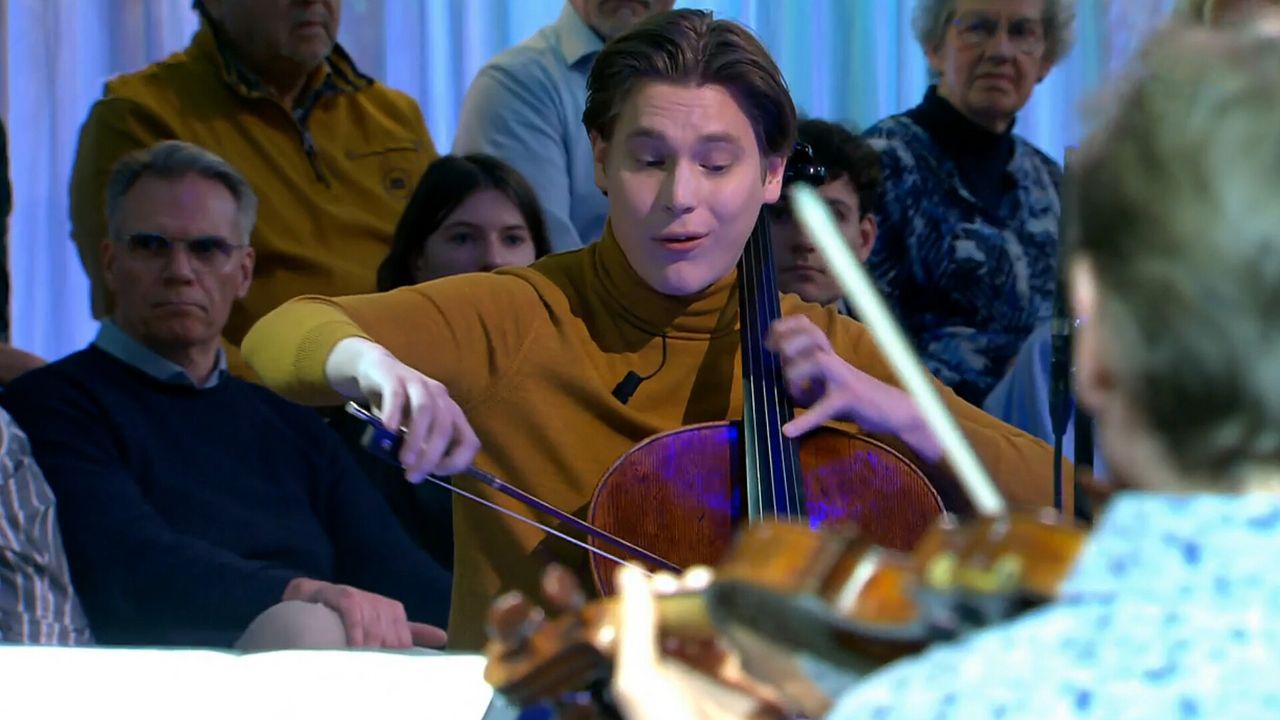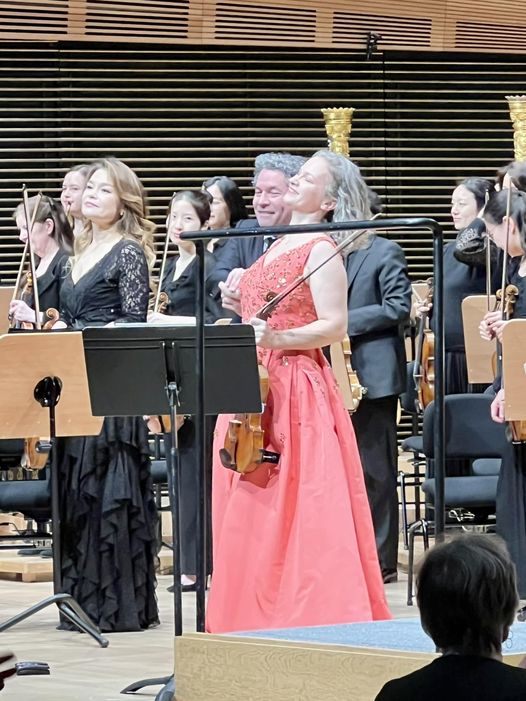Breaking: ENO music director resigns in cuts protest
NewsMartyn Brabbins submitted his resignation tonight after seven years as music director of English National Opera. Brabbins said he could not continue to serve in a company whose board was proposing heavy personnel cuts to the orchestra and chorus.
Evidently, the first he learned of these cuts was in our reports on Friday.
His resignation is the honourable act of an honourable person. Would that there were a few of those on the ENO’s board.
Here’s Martyn’s statement:
As Music Director of English National Opera for the past seven years, and Head of its orchestra, chorus and music staff, I cannot in all conscience continue to support the Board and Management’s strategy for the future of the company. While my feelings on this have been developing for some time, it reached its nadir this week, with the internal announcement of severe cuts to its orchestra and chorus from 2024/25 season. In protest, this afternoon I tendered my resignation with immediate effect.
Although making cuts has been necessitated by Arts Council England’s interference in the company’s future, the proposed changes would drive a coach and horses through the artistic integrity of the whole of ENO as a performing company, while also singularly failing to protect our musicians’ livelihoods.
This is a plan of managed decline, rather than an attempt to rebuild the company and maintain the world-class artistic output, for which ENO is rightly famed.
I urge ACE to reassess this situation and recognise the devastating implications their funding decisions will have on the lives of individual musicians, as well the reputation of the UK on the international stage.
My wholehearted thanks and support go out to the entire ENO team, especially those in the departments I oversaw. I am incredibly proud of everything we accomplished, and I sincerely hope that the company will find a path that puts exceptional artistry front and centre of its future.






A planned decline is right. ENO used to be something great, think of the Power House days of Jonas and Elder but of interesting things since. If a company starts to lose artists like Brabbins, then it’s only a matter of time until the end. The country will culturally poorer. Welcome to Brexit Britain, the country that can’t keep an opera company for those that don’t speak or understand the great European languages. No wonder we’re f***ed.
Nothing to do with Brexit. Grow up.
Greetings from Sheffield, South Yorkshire. I felt slightly aggrieved when I read Simone’s comment, not so much because she dragged Brexit into her brief foray – that’s quite common – but because she seems to think that Brexit supporters must be inadequates, with no interest in The Great European Languages, no interest in languages other than the language which is obviously the greatest of all the languages of the world, English.
But that claim for English has to be modified in particular cases, in innumerable cases. Despite the artistic achievement of Britten’s ‘Peter Grimes’ and many other English language works – but there aren’t a vast number of these, I think – the greatest operas have texts that aren’t in English. The importance of English National Opera can easily be exaggerated. I take the view that producing an opera in the original language is generally essential. (I also take the view that English National Opera could have been protected and should have been protected.) It isn’t exactly a travesty to present Die Entführung aus dem Serail, Die Zauberflöte, Le nozze di Figaro and Cosi fan tutte in English but it has great disadvantages.
An article of mine published in ‘Conservative Woman’ came with this profile of me, ”Paul Hurt lives in Sheffield and is one of those working-class Conservatives you hear about. Voted for Brexit, of course, and drives a white van.’ My first job was as a builder’s labourer, I still do a great deal of manual work, although I’ve now picked up various skills, for example in woodworking and metalworking and building construction. I speak in Sheffield dialect but I write in standard English, of course.
As we might say in Sheffield, Sorry, Simone luv, but tha’t mekkin a bad mistake. I’ve never found that voting for Brexit has hindered my interest in languages. I’ve translated poetry from German, Dutch, French, Italian, Latin, Classical Greek and Modern Greek and also translated from Hebrew. I’ve written on the prose in German of Franz Kafka. Before I visited Poland, I studied Polish so that I wouldn’t have to ask for anything in English when I visited the country. I sometimes write in French rather than English.
Simone’s comment, ‘No wonder we’re f***ed’ is presumably a claim to do with national decline, not just the decline of an opera institution. On the evidence of the comment – not nearly enough evidence to be conclusive, of course – I wonder if recognition of complexities, avoidance of generalization, a much more broadly based view are congenial to Simone. She’d do well to consider a broader viewpoint, perhaps. Ludwig Wittgenstein, writing in ‘Philosophische Bemerkungen,’ writes memorably of the pitfalls of too restricted a view of things, ‘…einseitige Diät: man nährt sein Denken nur mit einer Art von Beispielen.’
‘Conservative Woman’ was kind enough to publish an article I wrote, a very critical article on Labour Friends of Israel – at the time, the deranged anti-Semite Jeremy Corbyn was a member and so was Keir Starmer, before his elevation to greater things in the Labour Party. I’m not Jewish but I’ve campaigned actively for Israel and still do. I’ve campaigned actively against its detractors, including the disrupters of concerts, contacted large numbers of people in the grip of Palestinian extremist ideology.
A short interlude: Some findings of the Pew Research Center:
Stoning to death for adultery may not be practised in the Palestinian territories but 84% of Palestinians support the punishment.
The conviction that a woman must always obey her husband is widely held, with 87% support in the Palestinian territories.
Support in Gaza for suicide bombings has declined but 62% of people in Gaza still believe that suicide bombings are often justified or sometimes justified to protect Islam. This is the highest level of support in the Islamic world.
There is widespread Palestinian support for such cruel punishments as amputation of the hand. 76% of people in the Palestinian territories support these punishments.
The statistics relate to opinions at the time of the survey, conducted in 2013 but I find no sign that the Palestinian territories have become transformed since then and are now liberal, tolerant places. Homosexuality is still illegal in Gaza (but not in the West Bank) and is punishable by imprisonment for up to ten years. This is a complete contrast with the freedom enjoyed by gay people in Israel.
I valued the pro-Israel stance of ‘Conservative Woman’ but although the article was well received and they wanted me to write more, I didn’t. I think of ‘Conservative Woman’ as a healthy corrective in a few areas, borderline deranged in others. Of course, it belongs to a much higher class of derangement than Jeremy Corbyn. Later, I wrote a series of very critical comments on ‘Conservative Woman,’ and all of them were published on the site. It’s to their credit that they didn’t censor or block any of them. The short profile of me accompanied the article I wrote.
I regard myself as just a reader – an appreciative reader – of the articles and comments on this site far more often than not.
To me, opera has enormous significance – amongst all its other strengths – as a reminder, but much more than a reminder – of the complexities of the world. Unjustifiable generalizations and simplifications, failure to recognize the importance of detail, to recognize contrasts, complexities, including incongruous, grotesque complexities – these and other failings are very common and often go unrecognized. I’ll single out another failing: the failure to recognize imperfection, the inevitability of imperfection in so many contexts, the importance of distinguishing between faults that can be corrected by reform or technical advances or other determined action and faults that are impossible to correct, faults which are an inevitable part of the human condition or human societies and faults which are assumed to belong to this category but which aren’t.
To fail in one respect isn’t necessarily to fail in all. Failures can coexist with massive strengths. I couldn’t possibly give the reasons why I voted for Brexit but I’ll quickly mention a few things. This will have to be not much more than a mention. Security and defence issues – at the time of the referendum, a large number of European countries were spending completely inadequate amounts on defence. In effect, they were relying upon other countries to defend themselves. The situation has changed for the better – the conflict in Ukraine has concentrated minds – but countries such as the Republic of Ireland and Austria still fail to recognize the importance of the issues. This country has a record in defending human freedoms which is cause for massive pride, most notably during the Second World War. It played a massive role in the liberation of Europe from Nazi control. Artistic achievements are vulnerable. If a country comes under the control of a tyranny and loses its freedom of action, then the consequences for artistic life are dire. A complication, some tyrannies have encouraged the arts, as with the worst tyranny of all, Nazi Germany – Jewish composers such as Mendelssohn were excluded, of course. One of the worst Nazis, Heydrich, was a talented violinist and played in string quartets.
Despite a very strong interest in the cultures of Germany and Austria, to me, their Nazi past still casts a strong shadow over the present. Both countries made completely inadequate atonement for their cruelties. In particular, Austria’s attempt at restitution was grossly inadequate, pitiful. I think of the European Union as a loose assemblage of very, very different countries bound by economics, encouraging important human values but with member states which fail to do nearly enough to safeguard freedoms. The rise of parties such as ‘Alternative für Deutschland’ may yet cause far more than misgivings for supporters of the European Union.
‘Minor’ issues as well as major issues can legitimately inform decisions such as the Brexit decision. I’ve a strong interest in animal welfare and I detest bullfighting, which takes place in France as well as Spain. The public spectacle of multiple stabbings which often don’t end with the sword thrust intended to kill the bull but which prolong the suffering of the animal – I feel a revulsion which was one of the factors which led me to vote for Brexit. Bullfighting involves self deception as well as cruelty. The claims made for bullfighting as an advanced art collapse when comparisons are made with musical achievements. The ‘bravery’ of the matadors, statistically very unlikely to be killed in the bullring, shrinks into insignificance when compared with the overwhelming dangers faced by members of the allied forces in the world wars.
All these considerations, and many more, have to be entered into a kind of ethical-practical balance sheet, taking into account advantages and disadvantages. The final decision may often be very difficult but I didn’t find the Brexit decision at all difficult.
Opera is a very complex art form. When a violinist plays the Bach sonatas and partitas for solo violin, or when a cellist plays the cello suites, there’s far less to go wrong, a far greater possibility of giving a flawless or almost flawless performance. In the case of opera, this is impossible. The higher notes of a soprano or bass may be aesthetically just about perfect, the lower notes far less so, the strings of the opera orchestra may play wonderfully, but with reservations, the woodwind may be very mixed in standard, but perhaps less so in the first act, the director’s work may be imaginative in some ways, disastrous in others, performances which aren’t that far from perfection in all or most areas are likely to fail in others.
Operas are very complex forms of art but societies and countries are much more complex. Some of them may be very, very successful economically but artistically negligible. Some countries fail in almost every respect, but individuals in those countries may have great strengths. Obviously, the possibilities are endless.
I don’t say in the least that people who comment on ‘Slipped Disk’ should fill up the space with detail and complexities. There’s obviously a space for brief comments witty ripostes – which are delightfully common on this site – enjoyable writing, again, common.
One more thing. I don’t think that there’s a way to edit a comment once it has appeared on the site. I’m incapable of writing a comment which I’m satisfied with. I like to be able to revise it and get rid of the faulty bits, if I possibly can. Simone, and many others, may well feel that if I could revise this comment, I should get rid of the lot.
I’m editing my comment above by replying to it. Jeremy Corbyn and Keir Starmer were a member of Labour Friends of Palestine and the Middle East for years, not members of Labour Friends of Israel, as I mistakenly claimed in my comment. I didn’t make a slip of the pen but I must have made a series of slips on the keyboard. Keir Starmer left the outfit, eventually, but Corbyn may still be a member. I haven’t been able to find any useful information.
Alongside more elevated virtues and strengths, real and imaginary, basic competence, care for the rock-bottom basics, will always hold an essential place, in arts administration as well as politics. Or will it? Is this notion threatened already, regarded as quaint? (From what I’ve read in ‘Slipped Disc,’ some people seem to treat their work in arts administration as a branch of politics.) If looking good takes priority over being good and being good at something which is important for the health of an organization and the well-being of people in it, then something’s badly wrong.
The Website of Labour Friends of Palestine is and always has been a vanity website. The current incarnation of the site tells the reader practically nothing. When Lisa Nandy MP took over the Chairpersonship, she seems to have made Website cosmetics a priority and neglected the basics, such as the membership list.
Michael Meacher, MP for Oldham West and Royton died in 2015 and replaced by Anthony Lloyd in 2017 but after he died, he stayed on the membership list for year after year. The membership list is only for MP’s, and living MP’s, not ex-MP’s, and deceased MP’s. The Website claimed in 2020 that ‘Currently, 131 MP’s support our work in Parliament. A false claim. The actual number was far fewer, 93. MP’s who left to become Mayors, such as Sadiq Khan, stayed on the list, as well as many members who lost their seats at a General Election.
Always check the facts!
Thanks Martyr Brabbins but it’s all happened on your watch.
Not a helpful comment
WOW! Brabbins is an absolute legend and good on him for taking such a strong and principled stance. Hopefully another company will snap him up!
Always been a fan of Martyn Brabbins. Shame for ENO to lose such a musicians’ musician at the helm.
Perhaps Mr Brabbins can find new work in San Francisco!
In seriousness this is extremely commendable and honorable as you say. I hope that the English National Opera will reconsider this cut.
This feels like the tip of an iceberg, no?
There still are people with a conscience and the courage of their convictions.
I can’t say I was the biggest fan of his interpretations, but my goodness I respect him as a person and a musician.
Doubt that he heard about it here first as he would surely have been involved in the decision making process. It reads more like he reached the end of his tether with a board that doesn’t care enough about their musicians. Also I hadn’t read that there were chorus cuts coming too??
I pulled out the quote from Lord Sumption when he left the board in July – “ENO will become a mere brand-name for a fringe offering, a pale imitation of the real thing that we have been putting on in London for decades”. That was just about the move out of London, I wonder what he would think about this?
More artists taking stances like this would certainly create better dialogue between performers and management.
A strong and direct reaction from a fine musician of great integrity. Any opera house looking for a new music director should snap up MB with alacrity. Huge sympathy for all the musicians at ENO who will all be terribly affected by this shocking and short-sighted decision.
The former “culture” secretary whose policies set in train this awful process has so much to answer for, as do the weak-willed senior managers at Arts Council England.
The current ‘government’ – is it? – is stuffed full of the kind of libertarian philistines for whom any serious performing art is far above their cognitive level! Imagine Dorries attending an opera!
I did see Michael Gove at the 2012 ROH Ring Cycle. However, he’s never been given Culture, Media & Sport. Perhaps that’s why?… From further past, but in his post-MP days, also seen Portillo at a number of operas. However, like you, I can never imagine Dorries attending an opera (or even a classical concert for that matter). As for Mr Brabbins, if only others were so principled. He should not be out of work for long – unless other Boards are scared of such principles.
Very articulate statement. What a disaster this is
Bravo, Martyn. Knowing you and the way you think and work this comes as no surprise. Were more to be as principled as you.
ENO has lost the most competent leader it has had for many years – tragic but not unexpected! And no one told him about the cuts – he had to find out from Slippedisc!! Typical of ENO board!
Slightly confused by this – everyone is saying how it is such an act of solidarity and so commendable, but surely if your own opera company is in danger and you feel genuinely concerned for its survival, you WOULDN’T resign – you would fight for it until the bitter end. Sorry to say it, but seems like a bit of a cop out to me – jumping from a sinking ship you’ve had your fill of before the whole thing collapses, watch it sink on its own without you, and walk away to leave everyone to drown while making it look like you did the honourable thing.
Unless of course he believes his resignation will carry enough weight to turn around the decisions…
Have you considered that maybe he HAS been fighting all along on behalf of the chorus and orchestra members directly affected by this decision? And that perhaps he has been made aware that this is indeed the bitter end? Or do you think he should watch his former colleagues go on the dole while he continues to enjoy a generously-salaried position, knowing that there’s nothing he can do to change the Board’s decision?
It says he’s resigned, not retired – he is famous and generally respected, and is far more likely to get offered another position (possibly even better paid) while his former colleagues without agents and bargaining power are far less likely to have such luck. So yes, he will watch his colleagues go on the dole while he continues to get a salary – just in another place having nothing to do with them any longer. (I’m speculating that he will get another job by the way, but I doubt he would turn it down if he does). And I didn’t say he didn’t fight when he was there – Im just suggesting this decision is a practical one for him, as much as it seems to be a principled one.
Thinking about it now – the truly principled thing would have been for him to suggest cuts to his own salary, to compensate for others and in solidarity – rather than just quitting altogether. But either that didn’t occur to him or lower fees was not something he would accept… either way they’re further in a mess thanks to this, and he’s now free to find something ‘better’ – lose, win.
Incredibly sad Brabbins will leave ENO, and applaud his integrity in going.
In terms of your scoop and impact of the decision – it was much more considered, he definitely knew of the plan for restructure of music dept in the Autumn back in July at least – I knew of it myself in July through conversations with middle management and I don’t even work there! So he was waiting for the announcement in order to maximise the impact of his going.
Well done Martyn Brabbins. A man of principle, despite the fact that his decision must hurt him deeply. More musicians must protest against appalling decisions by the so-called ‘Arts Council’.
Would that politicians had such integrity!
Many do … but none of them are Tories! Far too busy plundering the public purse!
So little money required to get that company back on track, compared to what the UK burns away daily in a lost war!
Which ‘lost war’ are you thinking of? Neutrality didn’t liberate Europe from genocidal Nazis, neutrality won’t’ help Ukraine to defeat Russia, a neutral stance won’t help to safeguard the state of Israel. Declaring a war lost already is abject defeatism, which has never helped any just cause. At least neutral Switzerland shows determination in its preparations to defeat possible aggressors. The record of neutral Switzerland in helping other countries to resist aggression isn’t nearly so impressive. Why not consider the advantages of joining NATO? Commit yourselves to the defence of free and independent nations, to ensure they stay free and independent.
You know exactly which war and you have to accept that Russia will never leave the occupied regions. Pumping millions of pounds into this stalled conflict will not change a thing. Keep the money in Britain, use most of it to fight the cost of living crisis and use some to keep the arts alive!
Still waiting for Martyn Brabbins to come to our shores and conduct. He would bring a lot to the table here in the States.
So it has come to this. The core of any opera company is surely the orchestra. I well remember Haitink’s battle with the Royal Opera House when the orchestra was threatened with diminution while the house closed for major rebuilding. He won that dispute and the results are available for us to hear.
For all the recriminations against the board of the ENO the blame must surely lie with the disastrous round of Arts Council grants that in theory were to “level up” but in fact seemed to diminish opera in general round the country ( Glyndebourne Tour, WNO etc ). There has been a certain amount of back peddling by the Council but this is a stab to the heart of the ENO. Where is Nicholas Serota in all this?
We are in danger of loosing a major cultural asset and leader in its field. I despair.